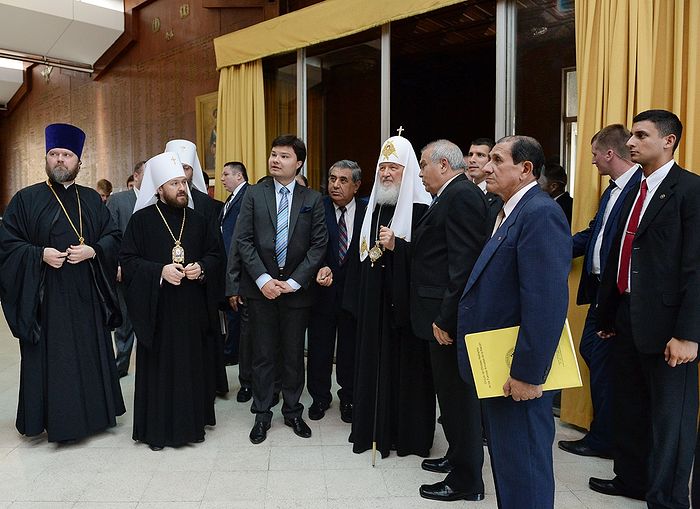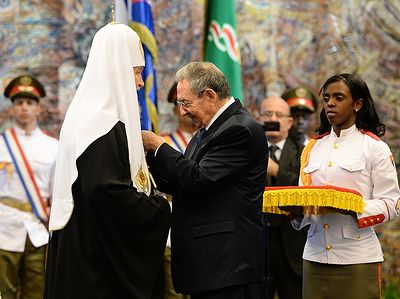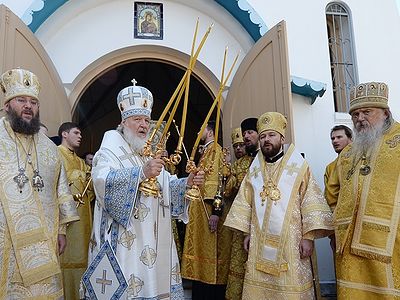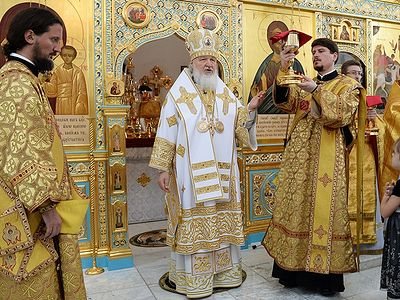Source: DECR Communication Service
February 16, 2016
On February 15, 2016, during his visit to the Republic of Paraguay’s capital Asuncion, His Holiness Patriarch Kirill of Moscow and All Russia visited the Russian plot at the central city Recoleta Cemetery, in which Russian émigrés, who joined the Paraguayan Army as volunteers and were killed in the Chaco War (1932-1935), were buried.
The primate of the Russian Orthodox Church honored the memory of the dead compatriots and read at the cemetery the prayer for the repose of their souls.
Participating in the prayer service were Metropolitan Hilarion of Volokolamsk, head of the Moscow Patriarchate Department for External Church Relations (DECR), Metropolitan Anthony of Borispol and Brovary, chancellor of the Ukrainian Orthodox Church, Bishop Peter of Cleveland (Russian Orthodox Church Outside Russia, ROCOR), Bishop Sergiy of Solnechnogorsk, head of the Moscow Patriarchate Administrative Secretariat, Bishop John of Caracas and South America (ROCOR), Bishop George of Canberra (ROCOR), Bishop Leonid of Argentina and South America, Bishop Nicholas of Manhattan (ROCOR), Bishop Anthony of Bogorodsk, head of the Moscow Patriarchate Office for Institutions Abroad, Archimandrite Philaret (Bulekov), DECR vice-chairman, Archpriest Andrey Milkin, head of the Patriarchal Protocol Service, and the Rev. Maxim Boyarov, rector of the church of All Saints Who Shone Forth in the Russian Land in Buenos Aires.
Praying at the service were descendents of first wave Russian émigrés. As a sign of respect for the memory of the Russian soldiers, the Paraguayan Army Guards of Honour clad in the uniform of Chaco War times lined up at the cemetery.
Prayers were lifted up for the repose of the souls of "the leaders and soldiers of our Motherland who gave their lives for this country and her people and for all Orthodox Christians buried in this land."
At the Society of Officers building, a meeting took place between His Holiness and compatriots and descendents of Russian émigrés. Participating in the meeting were Metropolitan Hilarion, Russian Ambassador N. Tavdumadze and Russia’s Honorary Consul I. Fleischer-Shevelev.
Greeting those present, Patriarch Kirill noted that he chose Paraguay as the first country in Latin America to be visited in his capacity as primate of the Russian Church, "because this country is associated with the heroic page of the participation of our soldiers in the struggle for the good of the Paraguayan people." This page is unique, he said. "It would seem that people who had survived a revolution and a civil war and had seen death, blood and suffering and, having left their country for a safe place, would prefer to live in tranquillity." But Russian émigrés rose in defence of their new homeland and made a decisive contribution to the victory in the Chaco War.
"Russian military specialists have done much for the building of the modern Paraguayan Army. Working here are also other well-educated people – scientists and engineers who took part in the development of higher education schools in Paraguay. For this reason, we should speak of the fate of Russian people in Paraguay in the post-revolutionary time," the patriarch added.
"And I certainly wanted to meet you, heirs of the glorious people who came to Paraguay at the time we are speaking about," His Holiness said, addressing descendents of Russian émigrés.
Among the speakers were also Mr. Fleischer-Shevelev and Ms Maria Olga Vyskolian, chair of the Association of Russians and Their Descendents in Paraguay.
Participants in the meeting appealed to Patriarch Kirill to send a priest to Asuncion for service. His Holiness promised to comply with the request.
"It is difficult to organize Church life without a priest. And in places where Church life is fading away, the ethnic culture begins to fade away as well," His Holiness noted, supporting the opinion expressed by the speakers that "even everyday life customs," the more so the language of one’s ancestors should not be forgotten.
"The children and grandchildren should speak Russian. I clearly understand why the language is being forgotten. Everyday we encounter some problems, big and small. And if everybody around speaks in a different language, you too have to speak it. This departure from the native, historical language happens naturally," Patriarch Kirill explained, adding that one of the tasks for the Russian Orthodox Church in the far-abroad countries is to "support the Russian language, Russian culture and to have a school for children to teach Russian and the history of Russian culture."
His Holiness said that before coming to Paraguay he read the difficult story of the Orthodox Church and parish in Asuncion and noticed that "the departure of the priest was always accompanied with a decrease in the level of life at the parish. Therefore, it is the most delightful thing that I have just heard here. It is that you all want that there should be a priest. I deeply bow before you for this. We will try to do all, so that your wish may become a reality."
Patriarch Kirill also mentioned the division still existing between the faithful in Paraguay who rank themselves as belonging to the Russian Orthodox tradition. "I am aware that there are some divisions existing up to now. It is regrettable, of course," His Holiness said. According to His Holiness, after the reunification of the Moscow Patriarchate and the Russian Church Outside Russia, the Orthodox who live in the far abroad should be members of one Russian Orthodox Church. "So, I pray and hope that all these divisions will be over, too. I believe the work of a priest residing in Asuncion will help towards it," the patriarch said with hope.
"I was very glad to meet you. You are very energetic people. You have preserved yourselves as a community. May God help you to continue preserving and strengthening the faith and strengthening your spiritual and cultural bonds with the Motherland. On our part, we will try to help you in this endeavour," Patriarch Kirill said in conclusion.
After that, a concert was given at the House of the Society of Officers by the Moscow Patriarchate clergy choir conducted by the Rev. Sergiy Golev.
Before the beginning of the concert, His Holiness Kirill spoke again about the Chaco War as one of the prominent pages in the history of Paraguay, in which Russian officers took part.
"It is amazing how foreigners who came to Paraguay became aware of their personal responsibility for the fate of this country; so much so that they were ready to give their lives for the interests of the state which gave them refuge. It is difficult to imagine, especially in our pragmatic age, that people can do so. These Russian officers were not mercenaries. They did not receive much money for their participation in the war. They shared all the hardships with Paraguayan officers and soldiers and did much to bring victory closer," he said.
"I thank God for making my visit to Paraguay help me to come to a better understanding and feeling of that dramatic episode in the history of the Russian diaspora. May the Lord bless Paraguay!" His Holiness exclaimed in conclusion.




